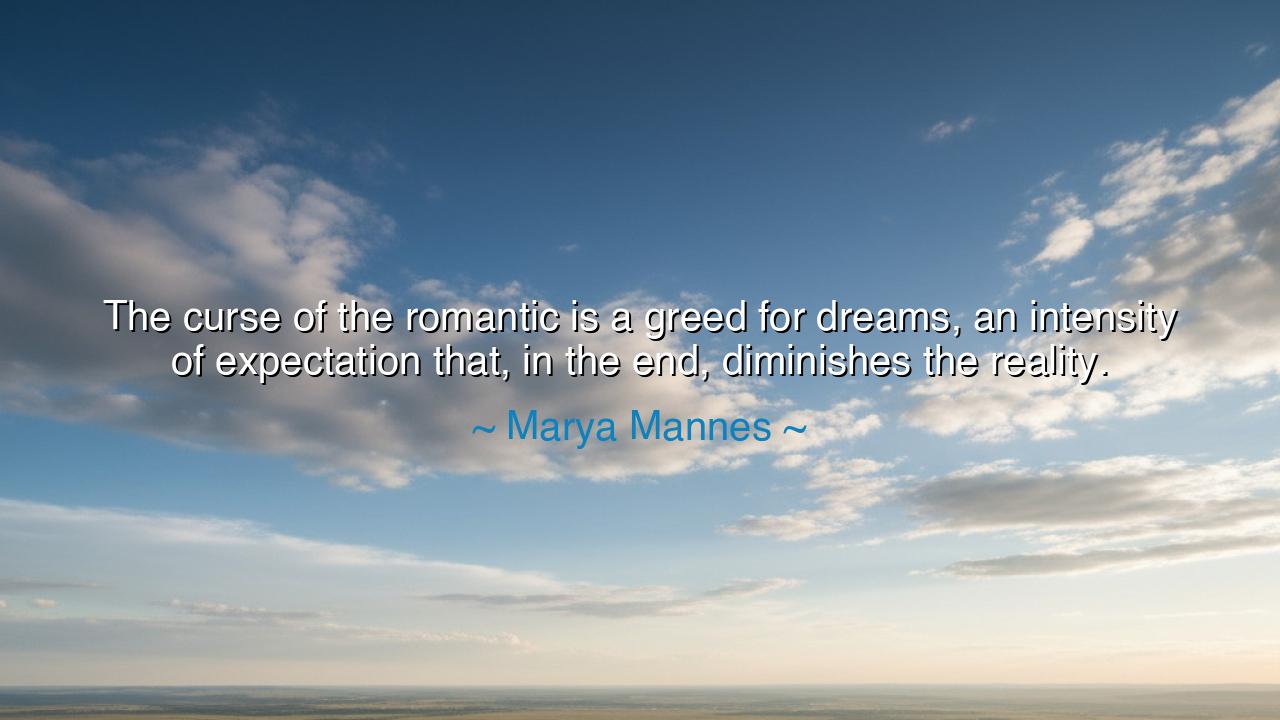
The curse of the romantic is a greed for dreams, an intensity of
The curse of the romantic is a greed for dreams, an intensity of expectation that, in the end, diminishes the reality.






In the haunting and reflective words of Marya Mannes, a sharp observer of the human condition, we find a profound warning about the nature of desire and illusion: “The curse of the romantic is a greed for dreams, an intensity of expectation that, in the end, diminishes the reality.” In this sentence, Mannes gives voice to the eternal struggle between vision and life, between what we long for and what the world can give. Her words are not a condemnation of dreams, but a recognition of their peril when they grow too consuming — when the heart’s hunger for beauty and perfection eclipses the imperfect yet precious truth of what already is.
The origin of this quote lies in Mannes’s lifelong reflection on art, society, and the restless soul of modern man. A writer, critic, and thinker of mid-20th century America, she saw how people — artists, lovers, and dreamers alike — often chased ideals so radiant that no reality could match them. The romantic, in her eyes, is one who feels life too deeply, who dreams not in moderation but in torrents. Such a person lives with intensity of expectation, believing the world should mirror the poetry of their imagination. But therein lies the curse: when one’s expectations become greater than life itself, even the most wondrous moments can seem insufficient. For the romantic who longs for stars, the earth, no matter how fertile, can feel barren.
To say there is a greed for dreams is to reveal the hidden shadow of imagination. Dreaming, in its purity, is sacred — it lifts the soul, it gives birth to art, it inspires love. But when desire turns into greed, the dreamer ceases to be nourished by vision and begins to be consumed by it. The romantic, unable to accept the limits of the human world, begins to demand from life what life cannot give — a love without flaw, a success without struggle, a beauty untouched by decay. Thus, they set themselves against reality, and reality, being unbending, inevitably wounds them. It is not that the dream betrays them, but that they have mistaken the dream for the world.
History offers us many who bore this romantic curse. Consider Lord Byron, the poet whose words burned with passion and melancholy. He sought beauty, adventure, and love in every corner of life, yet found himself forever unsatisfied — haunted by the very ideal he worshipped. His life was a pursuit of perfection that the earth could not offer, and so he lived in brilliance, but also in torment. Like many artists of his kind, Byron did not die because of the world’s cruelty alone, but because of the weight of his own expectation — the yearning for something beyond the reach of flesh and time. His story reminds us that the dreamer’s flame, if not tempered by wisdom, can consume the dreamer himself.
Marya Mannes’s insight reaches beyond art and into the ordinary lives of all who love deeply or hope fiercely. The lover who expects a perfect soul in another will always find disappointment. The creator who imagines eternal genius will always face despair. The seeker who demands that life resemble the golden image in their mind will always feel cheated by reality. Yet it is not life that is small, but the illusion of perfection that blinds us to its beauty. The romantic must learn, as all must, that reality is not the enemy of dreams, but their proving ground — the place where ideals must take flesh and where beauty, to endure, must coexist with imperfection.
The lesson, therefore, is not to abandon dreaming, but to balance it with reverence for the real. Dream fiercely, but do not let your greed for dreams make you despise the earth beneath your feet. Love, even when it falters. Create, even when your work falls short of vision. Accept the imperfection of the moment, for within that imperfection lies the seed of truth. Let your dreams guide you, but do not let them govern you. As the ancients taught, the wise walk the middle path — between imagination and acceptance, between longing and gratitude.
So, my child of vision and longing, remember Marya Mannes’s wisdom. The dream is sacred, but so is the world. The stars are distant, but their light falls upon your hands — that is miracle enough. Do not let the hunger for what might be blind you to the wonder of what already is. To live fully is not to surrender your dreams, but to cherish reality through the eyes of the dreamer — to see in the imperfect the echo of perfection, and in the ordinary the pulse of the divine. For when expectation softens into appreciation, the curse of the romantic becomes its blessing — the power to love the world, not because it is flawless, but because it dares to exist at all.






AAdministratorAdministrator
Welcome, honored guests. Please leave a comment, we will respond soon